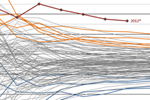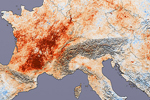
Sea ice extent hits record low on August 26th. Image courtesy of the U.S. National Snow and Ice Data Center (NSIDC).
One of the most visible impacts of climate change—melting summer sea ice in the Arctic—just hit a new milestone. Scientists with the U.S. National Snow and Ice Data Center (NSIDC) have declared that this year’s Arctic sea ice extent dipped below the previous record set in 2007 as of yesterday. The record is even more notable, however, as it occurred more than a fortnight before the Arctic’s usual ice melt season ends, meaning the old record will likely not just be supplanted, but shattered.
“The persistent loss of perennial ice cover—ice that survives the melt season—led to this year’s record summertime retreat,” explains Joey Comiso, senior research scientist at NASA’s Goddard Space Flight Center, in a press release. “Unlike 2007, temperatures were not unusually warm in the Arctic this summer.”
As of yesterday, Arctic sea extent hit around 4.10 million square kilometers (1.58 million square miles), beating the 2007 record by 70,000 square kilometers—so far. Although satellite measurements of sea ice only go back to 1979, recent modeling research has found that the current decline in sea ice is unprecedented for at least the last 1,450 years.
Over the last decade, Arctic sea ice has been vanishing far faster than scientists predicted. Not long ago scientists thought the Arctic might be free of ice in the summer by 2100, but as sea ice continued to decline at a rate faster-than-expected that date was moved up to 2050. Now, some researchers say the Arctic could be ice-free by the end of the next decade or even this one, an event that hasn’t occurred for at least 2.5 million years.
“By itself it’s just a number, and occasionally records are going to get set. But in the context of what’s happened in the last several years and throughout the satellite record, it’s an indication that the Arctic sea ice cover is fundamentally changing,” says Walt Meier, a scientist with the NSIDC. The six lowest sea ice years have all occurred since 2007 according to the organization.
A loss of Arctic sea ice is expected to have major impacts on the region’s wildlife including polar bears, narwhals, walruses, and seals. Loss of sea ice is also expected to exacerbate regional warming as ice reflects sunlight back into space. Less sea ice, means more of the ocean is heating up.
Recent research also shows that the decline in Arctic sea ice could already be having an impact far afield. More heat in the Arctic ocean—due to less sea ice overall—slows down and curves the jet stream, causing bizarre weather patterns to become stuck, known to meteorologists as blocking patterns. For example, these odd jet stream patterns have been blamed for extreme winters in the northern hemisphere, when a winding jet stream brings Arctic air south, and longer-than-usual weather patterns, such as the prolonged heatwaves that hit the U.S. this year.
According to scientists, current climate change, which has warmed the Earth by 0.8 degrees Celsius (1.44 degrees Fahrenheit) since the early Twentieth Century, is caused by greenhouse gas emissions due to the burning of fossil fuels, such as coal, oil, and gas, as well as the destruction of carbon-rich ecosystems like rainforests.
Related articles
Greenpeace abandons occupation of Arctic oil drilling rig after workers throw metal at them
(08/26/2012) On Friday the head of Greenpeace, Kumi Naidoo, and five other activists occupied an Arctic oil platform owned by Russian oil and gas giant Gazprom to protest exploiting fossil fuel beds in the Arctic ocean. The action by Greenpeace was short-lived after workers began spraying them with cold water from high-powered hoses and then threw pieces of metal at them, according to Naidoo, who communicated via Twitter during the civil disobedience.
(08/16/2012) Four weeks before Greenland’s melting season usually ends, it has already blown past all previous records. By August 8th, nearly a month before cooler weather usually sets in around the world’s largest island, the island toppled the past record set in 2010.
Arctic sea ice approaches another record melt
(08/22/2012) Sea ice extent in the Arctic is very near to beating the previous record low set in 2007, according to the U.S. National Snow and Ice Data Center. Researchers told Reuters that they expect the record to be beaten by the end of month, well over a week before the melt season ends in the frozen north.
July 2012: hottest month in U.S. history

(08/08/2012) Last month was not only the hottest July in U.S. weather history, but the hottest month ever recorded in the contiguous U.S, besting a record struck in July 1936 during the Dust Bowl, according to new data from the National Oceanic and Atmospheric Administration (NOAA). The average temperature last month over the contiguous U.S. was 77.6 degrees Fahrenheit, or 3.3 degrees Fahrenheit above the 20th Century average. Making matters worse, crippling drought continued to spread over 63 percent of the lower 48 states.
Extreme heatwaves 50 to 100 times more likely due to climate change

(08/05/2012) A recent rise in deadly, debilitating, and expensive heatwaves was caused by climate change, argues a new statistical analysis published in the Proceedings of the National Academy of Sciences (PNAS). Climatologists found that extreme heatwaves have increased by at least 50 times during the last 30 years. The researchers, including James Hansen of NASA, conclude that climate change is the only explanation for such a statistical jump.
(08/02/2012) Tropical vegetation grew along the coast of Antarctica 52 million years ago, an indication to dramatic climate shifts linked to elevated carbon dioxide levels in the atmosphere, report scientists in Nature.
Prominent climate skeptic reverses course, says global warming worse than IPCC forecast
(07/30/2012) After starting his own project to study global warming, a once-prominent climate change skeptic and physicist says he now accepts the reality of anthropogenic climate change. “Last year, following an intensive research effort involving a dozen scientists, I concluded that global warming was real and that the prior estimates of the rate of warming were correct. I’m now going a step further: Humans are almost entirely the cause,” Richard Muller writes in the New York Times as his team, the Berkeley Earth Project, releases a new paper that finds an even stronger link between greenhouse gas emissions and rising temperatures worldwide than the Intergovernmental Panel on Climate Change (IPCC).
Republican stalwart calls global warming ‘a matter of fact’, pushes for carbon tax
(07/13/2012) Former Secretary of State George Shultz is calling for a carbon tax to reduce U.S. greenhouse gas emissions and oil consumption, according to an interview released today by Stanford University.
Deja vu: U.S. undergoes hottest 12 months on record…again and again
(07/12/2012) According to new data from the National Oceanic and Atmospheric Administration (NOAA)’s National Climatic Data Center, the last twelve months have been the warmest on record for the contiguous United States. This record, set between July 2011 through June 2012, beat the last consecutive twelve month record set only a month earlier between June 2011 and May 2012, which in turn beat the previous record holder, you guessed it: May 2011 through April 2012.














